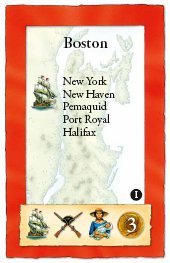First we need an idea of what the game is like. It's a deck building game (the genre brought to the mainstream by Dominion) that has a lot of very interesting twists. It's similar to Dominion in that you start with a basic deck which you use to acquire more cards which get put in your discard pile. Then when your deck is exhausted you shuffle the discard pile. As such you end up drawing the new cards which determine what actions you can take in future turns. Deck building games tend to have a period of time where you're building up a powerful deck and then a period of time where you use your powerful deck to win the game (typically by picking up efficient point scoring cards). A Few Acres of Snow takes that idea and changes the dynamic in a few ways to end up with a substantially different game. Those changes are:
- It's strictly a 2 player game which allows for more player interaction. There can be ways to attack the other player and good 'blocking' plays can exist that aren't just kingmaking.
- The game is asymmetrical. Each player starts with their own deck and has their own set of cards to add to their deck as the game goes on. There are a few communal cards that either player can buy but by and large if you buy something it doesn't stop your opponent from buying the same card since they'll have their own copy.
- Money is built up over time and isn't exhausted each turn. This means you don't need to be capable of generating cash every turn where you want to spend cash. One of the annoying things in Dominion for me is having a turn with 7 bucks and then a turn with 9 bucks. Someone who gets exact change (8 and 8) will outscore you. That's gone here since you carry over extra money every turn. It also allows cards to have minor costs tacked on to them since you can spend some of your stockpile to activate them.
- There's a board! The game simulates the French/British conflict in North America. The board has spots for cities which you can go around settling. Most of these spots are worth points for game end and all provide you with an extra card for your deck.
- Many of the cards have multiple ways in which they can be used. The Boston card, for example, can make money, or let you merchant, or provide a military strength, or give you a boat for coastal travel, or lets you connect to New York, New Haven, Pemaquid, Port Royal, and Halifax. It can also be used to upgrade a settlement to a city. It can be used to provide settlers to initially colonize a settlement location. Finally it can block incoming raids at Boston. That's a lot of versatility for one card!
- Perhaps most importantly... You don't discard unused cards at the end of the turn! You do draw back up to 5 cards after each turn (where you can take 2 actions) but you don't have to discard the stuff you haven't used. This does all sorts of things to the way the game is played. It lets you actually play with defensive cards and know they'll get to do their thing. Moat in Dominion is a pretty swingy card. If you keep drawing it the turn your opponent draws his attack card it's amazing. If you never draw it when they draw their attack card it's absolute garbage. But if you could always hold on to your moat until you need it? That has potential. There are still plays that can be made (buy 2 attack cards to use in the same turn, use your attack right after they reshuffle and draw it again before they can draw their defense) and it does clog up their hand the whole time. But those are all things you can control unlike the timing of card draws in Dominion. It also lets you build a deck with certain combos in it since you know you can always hold on to the first piece until you draw the second one. And it heavily punishes players who fill their deck with useless garbage. If you don't have a way to use a card you don't get to just cycle it away at end of turn. You have to take some action to get rid of it. (You can discard a card as one of your actions, for example. Or you could buy the governor that permanently removes cards from your deck.) Tracking hands becomes a thing you can do and actually make plans with that information. In all it really feels to me like this change more than anything else adds a lot of skill to the game.

In future posts I'll go into more detail about the different types of actions that can be taken and then I'll try to delve into how those actions actually help progress towards a victory condition.
No comments:
Post a Comment